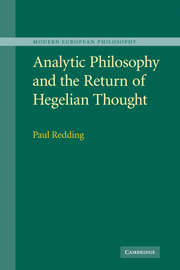Book contents
- Frontmatter
- Contents
- Acknowledgements
- Introduction: analytic philosophy and the fall and rise of the Kant–Hegel tradition
- 1 McDowell, Sellars and the myth of the perceptually given
- 2 Brandom, Sellars and the myth of the logical given
- 3 Individuation and determinate negation in Kant and Hegel
- 4 The Kantian route to Hegel's inferentialism
- 5 Aristotelian Phronesis and the perceptual discernment of value
- 6 Kant, Hegel and the dynamics of evaluative reason
- 7 Hegel and contradiction
- 8 Hegel, analytic philosophy and the question of metaphysics
- Bibliography
- Index
8 - Hegel, analytic philosophy and the question of metaphysics
Published online by Cambridge University Press: 22 September 2009
- Frontmatter
- Contents
- Acknowledgements
- Introduction: analytic philosophy and the fall and rise of the Kant–Hegel tradition
- 1 McDowell, Sellars and the myth of the perceptually given
- 2 Brandom, Sellars and the myth of the logical given
- 3 Individuation and determinate negation in Kant and Hegel
- 4 The Kantian route to Hegel's inferentialism
- 5 Aristotelian Phronesis and the perceptual discernment of value
- 6 Kant, Hegel and the dynamics of evaluative reason
- 7 Hegel and contradiction
- 8 Hegel, analytic philosophy and the question of metaphysics
- Bibliography
- Index
Summary
With the claim that Hegel's metaphysical inadequacies were consequent upon problems in the logic from which he started, the view expressed by Russell at the beginning of the twentieth century at least concurs on one issue with that of Hegel's sympathetic ‘post-Kantian’ interpreters at the turn of the twenty-first: it suggests the degree to which Hegel's ‘metaphysics’ was somehow grounded in or guided by logic, and as such suggests a distinctly Kantian dimension to Hegel's approach that is the point of contact between recent analytical receptions of Hegel and his contemporary ‘non-metaphysical’ interpreters. To bring into view what it is at stake in such debates over ‘metaphysics’, a three way comparison between Aristotle, Kant and Hegel may be helpful.
In a study of the relation of Kant's approach to the categories to that of Aristotle, Manley Thompson has suggested that Kant effectively reversed the relation of logic to ontology found in Aristotle's Categories. First, for Aristotle the categories had a primarily ontological significance, while in Kant their significance becomes primarily epistemological. But Thompson further links this difference to that aspect of Kant that Brandom has emphasized and which he sees as the path to Hegel's inferentialism – Kant's turn to the proposition as the most basic meaningful unit of thought. Thompson describes this in terms of the different ways in which Kant and Aristotle each use ‘the notion of combination in determining the number of categories’.
- Type
- Chapter
- Information
- Analytic Philosophy and the Return of Hegelian Thought , pp. 220 - 236Publisher: Cambridge University PressPrint publication year: 2007



